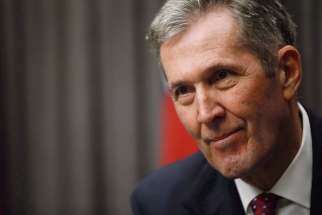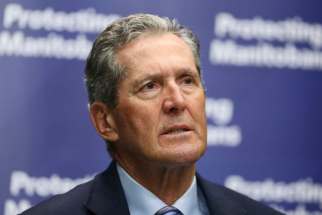The road to net-zero is navigable, but difficult
Read this article for free:
or
Already have an account? Log in here »
To continue reading, please subscribe:
Monthly Digital Subscription
$0 for the first 4 weeks*
- Enjoy unlimited reading on winnipegfreepress.com
- Read the E-Edition, our digital replica newspaper
- Access News Break, our award-winning app
- Play interactive puzzles
*No charge for 4 weeks then price increases to the regular rate of $19.00 plus GST every four weeks. Offer available to new and qualified returning subscribers only. Cancel any time.
Monthly Digital Subscription
$4.75/week*
- Enjoy unlimited reading on winnipegfreepress.com
- Read the E-Edition, our digital replica newspaper
- Access News Break, our award-winning app
- Play interactive puzzles
*Billed as $19 plus GST every four weeks. Cancel any time.
To continue reading, please subscribe:
Add Free Press access to your Brandon Sun subscription for only an additional
$1 for the first 4 weeks*
*Your next subscription payment will increase by $1.00 and you will be charged $16.99 plus GST for four weeks. After four weeks, your payment will increase to $23.99 plus GST every four weeks.
Read unlimited articles for free today:
or
Already have an account? Log in here »
Hey there, time traveller!
This article was published 25/05/2021 (1666 days ago), so information in it may no longer be current.
A Paris-based energy agency last week outlined a series of steps that would reduce worldwide burning of coal, oil and natural gas fast enough over the next 30 years to spare the planet from intolerable warming. The plan shows that the goal is difficult but perhaps achievable.
The plan was written by the International Energy Agency, which was established by Canada and other oil-importing countries in 1974 to ensure security of oil supplies. The agency has now switched gears to figure out how the world will get along without fossil fuels. The aim is to reduce air pollution so that global warming will be kept below 1.5 degrees Celsius above pre-industrial levels.
Despite all the ambitious talk of political leaders about saving the planet, the current rate of fossil fuel use and the present government policies will bring the global temperature rise to a catastrophic level of 2.1 degrees Celsius by the year 2100, the agency estimates. The big idea that we should stop fuelling our vehicles with gasoline and heating our buildings with natural gas can seem totally impractical at first glance. The IEA plan, entitled Net Zero by 2050: a Roadmap for the Global Energy Sector, breaks the big idea down into smaller steps which seem conceivable, though still extremely daunting.
Expansion of coal mines or development of new oil or gas fields must cease.
To start with, expansion of coal mines or development of new oil or gas fields must cease. No one should buy a gas-fired or oil-fired furnace to heat a building after 2025. All new passenger cars should be electric-powered after 2035. Wind farms and solar panels should sprout in all countries to replace the coal- and gas-fired power plants that must close.
The IEA presents the engineering and economic challenges in specific detail. It is less helpful on the political obstacles. China, India and Indonesia are powering their rapid economic growth by mining their abundant coal deposits and building power plants to burn the coal. Despite the notorious air pollution that afflicts Beijing, New Delhi and Jakarta, they plan to continue on this course while talking a good game about saving the planet later on.
The IEA plan warns that without international co-operation, global carbon dioxide emissions will not fall to net zero by 2050. The United Nations has been holding conferences and issuing declarations to stop global warming since June 1972. Fossil fuel use has increased pretty steadily during that half-century and air pollution has steadily worsened.
That record suggests that the prospects for international co-operation are at best dim. The November Glasgow meeting of the governments that signed the United Nations Framework Convention on Climate Change will be the next major test of political leaders’ ability to overcome the political obstacles that have always defeated them up to now.
The IEA roadmap to net-zero may be a step toward better international co-operation. It does not show how to stop countries from kidding themselves by extravagant estimates of their own carbon-capture efforts. It doesn’t show how jurisdictions such as Oklahoma, Texas, Alberta and Saskatchewan are supposed to adjust to the drying up of oil revenues. It doesn’t show Newfoundland oil rig workers what they are supposed to do with the rest of their careers.
The IEA plan warns that without international co-operation, global carbon dioxide emissions will not fall to net zero by 2050.
The plan does, however, help bring the technical and economic challenges into clearer focus. The governments that will meet at Glasgow now have a slightly better idea what needs to be done.
It (IEA roadmap) does not show how to stop countries from kidding themselves by extravagant estimates of their own carbon-capture efforts.









